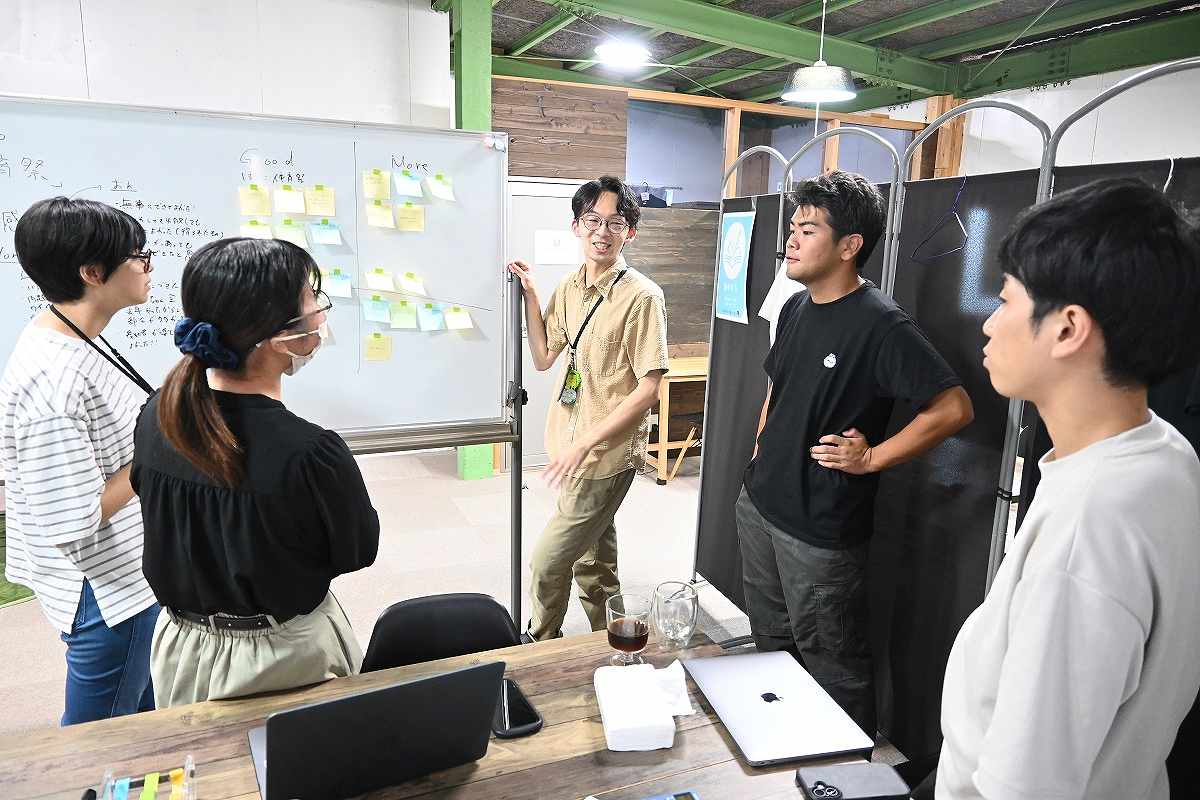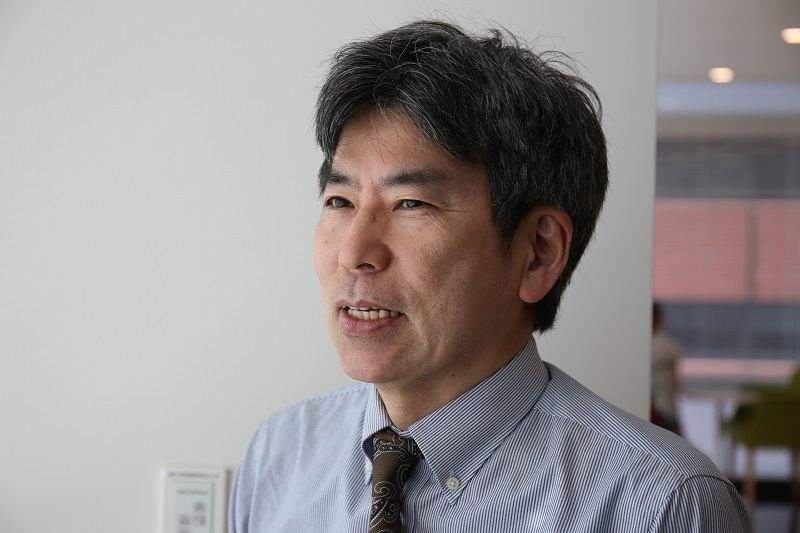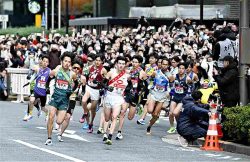‘Social education’ Boosts Local Social Infrastructure;Lives Enriched By Participation In Shared Projects

Members of volunteer group Machinowa and others hold a meeting on Sept. 28 in Masuda, Shimane Prefecture, to review a sports festival they had organized. At center is Yuya Ikuta, a staff member of general incorporated association Yuta-Lab, which facilitates such activities.
8:00 JST, October 26, 2024
Even after graduating from school and entering the workforce, people can continue to learn. Organized learning outside of school takes various forms that are collectively called “social education.” However, the essence of social education remains ambiguous as to who teaches whom, and what, and for what purpose. I believe that the very act of learning itself contributes not only to the vitality of the community, but also to the well-being of the individual.
In late September, I visited the city of Masuda, Shimane Prefecture, to explore how social education can contribute to the well-being of the individual. The city is known for making social education a central pillar of both human resource development and urban planning.
The first place I visited was the office of Yutakana Kurashi Laboratory (Laboratory for a rich life). Also known as “Yuta-Lab,” it is a general incorporated association established under the auspices of the city in 2020. Its role is to connect people in the community and support events and activities initiated by those connected. The goal is to provide people with opportunities to engage in community activities, helping them gain experience and eventually become independent contributors to the community.
Yuta-Lab’s office, located in the old part of town, has a cafe on the first floor and a space for studying and socializing on the second floor, making it a welcoming place for anyone to stop by. When I visited the second floor, six young members of a volunteer group called Machinowa were holding a review meeting about a sports festival they had organized a few days earlier.
It was the second time they had held the festival. It all began when some young people who often came to Yuta-Lab organized a dinner and bonded over their shared goal of getting more exercise. With the full support of Yuta-Lab staff member Yuya Ikuta, 27, they prepared the first festival, learning skills such as creating schedules, ordering promotional flyers, and arranging accident insurance for participants. Inspired by this experience, the organizing members and participants decided to plan a second festival, this time on their own. Around 30 families joined this year’s event, enjoying activities such as obstacle relays and board games, leaving with smiles on their faces.
Ikuta facilitated the review meeting, reminding members to avoid negative language to keep the discussion constructive. Using sticky notes, they summarized the event’s successes and challenges. Members shared thoughts like: “Everyone left with a smile,” “It would’ve been better with more time for introductions,” and “We needed to share more information in advance.”
Despite their busy schedules as working adults, the members seemed to enjoy the challenges they faced. I realized that the difficulties they encountered were part of the fun. Because they enjoyed the process, they were eager to organize future events. Yukie Ishibashi, 23, the first leader of the group, discovered her passion for coordinating community activities and now participates in various other events beyond Machinowa. Miho Shoju, 22, the current leader and an employee at a local company, shared her dream: “Next, I want to organize a cultural festival. Someday, I want to support community activities, just like Yuta-Lab.”
Kenichi Higaki, 32, Yuta-Lab’s executive director, explained that Yuta-Lab’s support — referred to as “accompaniment” — involves four key elements: providing encouragement to maintain motivation, teaching essential know-how, introducing necessary resources and people, and helping with reflection. “Reflection is the most important,” Higaki noted. “When people understand what they’ve learned, it naturally motivates them to take on new challenges.”
Masuda has long been known as a place of depopulation. Its population has been declining for decades. For years, 90% of young high school graduates moved out of the city and only 30% of college graduates returned. Its population, which was 45,000 in 2020, is now 43,000. In response, the city introduced its “Collaborative Human Development Plan” in 2016. This initiative focuses on education that encourages people to think about all aspects of life, work, family and community.
Yuta-Lab plays a central role in this effort. With a staff of 11 plus student interns, it manages “third spaces” that are neither home nor school. Yuta-Lab also coordinates sessions where children have one-on-one conversations with adults from the community or local businesses, helping them envision the kind of adults they want to become. Additionally, Yuta-Lab facilitates cross-company networking events for young employees, promoting regional engagement among young professionals.
Higaki explained, “Our job is to create and support spaces where people can gather, enrich their lives, and connect, just like a community center.”
This year marks the 75th anniversary of the Social Education Law, enacted in 1949. Traditionally, social education was intended to help disadvantaged people survive in a market society. Later, as society developed economically, social education changed to aim at enriching people’s lives culturally and spiritually, as well as to enable learning by personal choice according to individual needs.
According to Prof. Atsushi Makino of the University of Tokyo, when the board of education system was reviewed in the mid-2010s as part of decentralization as well as due to insufficient responses to bullying and suicide issues, some local government leaders argued that social education officers were not necessary anymore. The role of social education was then examined, and it was confirmed that it had in fact been playing a major role in building human infrastructure, with beneficial effects such as the management of evacuation centers in times of disaster and the revitalization of farming and mountain villages. “It is now recognized that social education creates connections between people and forms a rich social infrastructure,” Makino explained.
The COVID-19 pandemic further highlighted the importance of social education. As community festivals and events were canceled, the social fabric weakened. The government’s Fourth Basic Plan for Education, approved in 2023, emphasizes the role of social education in fostering connections and collaborative relationships. In June 2024, the education, culture, sports, science and technology minister requested the Central Council for Education to further explore the future direction of social education.
Among the council’s special committee members is Kotono Higashi, a 19-year-old student at Hosei University. Higashi founded the Kiire Manabiba Project Tsuwabuki, a volunteer group that creates learning spaces for children in Kiire, Kagoshima City.
When I visited the Kiire Community Center in mid-September, 11 young members, most of whom were high school students, had gathered for a meeting. They discussed workshop ideas for a city-sponsored social education festival scheduled for this coming January. They also discussed preparations for another regional festival and theme selection for a research project contest.
Higashi established the group in March 2021 during her first year of high school, inspired by an inquiry-based learning class. She began by surveying local junior high school students and opened a self-study space early in her second year. Since then, the group has organized educational events such as science experiments and stargazing sessions to create learning opportunities for local children.
More recently, they have organized events such as festivals that don’t appear directly educational at first glance. Higashi explained: “Everyone learns something different from experiences. No matter the event, there’s always something to gain.”
Second-year high school student Asahi Sako, 16, the group’s current president, reflected: “At first, I was amazed that older students had organized everything by themselves. But now that I’ve tried it, I realize how much support we receive from adults. In terms of my future career, designing posters made me think that becoming an illustrator could be a real goal. The more I engage with the community, the more I appreciate it. My dreams have evolved, and I’ve come to recognize the strength of the people supporting me.”
Hitomi Maehata, 17, the group’s vice president, added: “Every step of planning and organizing events is a learning experience. Interacting with people from the community has also helped me understand the realities we face.”
You can clearly see that such activities by young people not only revitalize the community, but also lead to the well-being of individuals. And that, I believe, is the meaning of lifelong learning. I would like to appeal to all adults to go out into society, learn, and do something with others. Of course, I would like to do the same.
Political Pulse appears every Saturday.

Makoto Hattori
Makoto Hattori is a staff writer in the Education News Department of The Yomiuri Shimbun.
Top Articles in Editorial & Columns
-

Riku-Ryu Pair Wins Gold Medal: Their Strong Bond Leads to Major Comeback Victory
-

40 Million Foreign Visitors to Japan: Urgent Measures Should Be Implemented to Tackle Overtourism
-

China Provoked Takaichi into Risky Move of Dissolving House of Representatives, But It’s a Gamble She Just Might Win
-

University of Tokyo Professor Arrested: Serious Lack of Ethical Sense, Failure of Institutional Governance
-

Policy Measures on Foreign Nationals: How Should Stricter Regulations and Coexistence Be Balanced?
JN ACCESS RANKING
-

Japan PM Takaichi’s Cabinet Resigns en Masse
-

Japan Institute to Use Domestic Commercial Optical Lattice Clock to Set Japan Standard Time
-

Israeli Ambassador to Japan Speaks about Japan’s Role in the Reconstruction of Gaza
-

Man Infected with Measles Reportedly Dined at Restaurant in Tokyo Station
-

Videos Plagiarized, Reposted with False Subtitles Claiming ‘Ryukyu Belongs to China’; Anti-China False Information Also Posted in Japan























